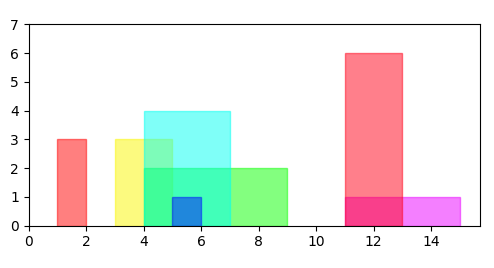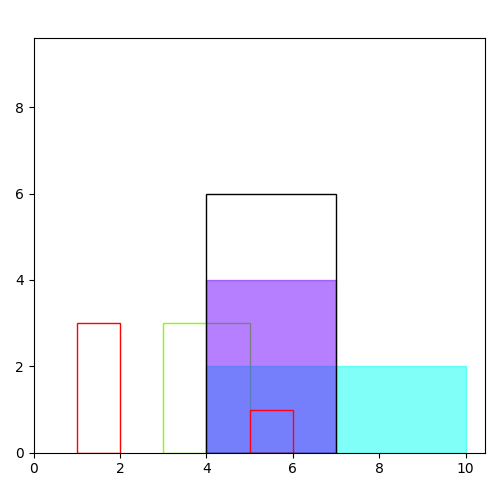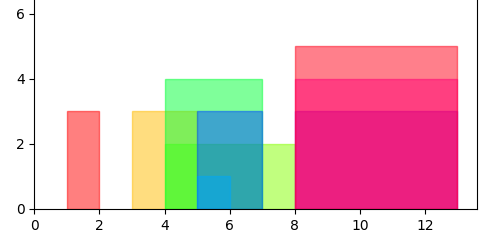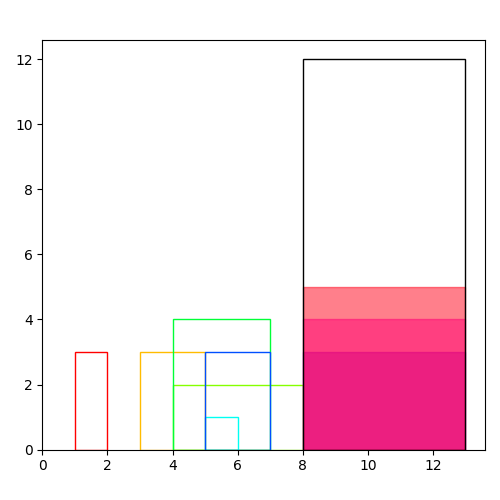Maximal Overlap of Rectangles

Find the maximal overlap of rectangles so, that every selected rectangle covers the full width of the overlap area.
A selected rectangle can be larger than the overlap area, but not smaller.
Problem Parameters:
- a set of rectangles aligned on the x-axis
- rectanges can have different heigt
- rectangles show arbitrary overlap
Model
Parameters
$$ i \in [1..N],\ \text{ index: N rectangles }\\ s_i \in R^+,\ \text{ start of rectangle \(i\) }\\ e_i \in R^+,\ \text{ end of rectangle \(i\) }\\ h_i \in R^+,\ \text{ height of rectangle \(i\) }\\ M \in R^+,\ \text{ Big-M constant, upper limit for x }\\ $$
Variables
$$ \delta_{i} = \begin{cases} 1, \ \text{ rectangle \(i\) is selected for the overlap }\\ 0, \ \text{ else }\\ \end{cases}\\ x_s: \text{ start point of overlap area on x-axis }\\ x_e: \text{ end point of overlap area on x-axis }\\ x: \text{ width of the overlap area }\\ $$
Constraints
$$ x = x_e - x_s\\ x_s \ge \delta_i s_i - (1-\delta_i)M, \forall i\\ x_e \le \delta_i e_i + (1-\delta_i)M , \forall i\\ x_s, x_e, x \in R^+\\ $$
Objective
The sum of the area of selected rectangles within the overlap boundaries should be maximized: $$ \max \sum_i \delta_i h_i x\\ $$
This objective is quadratic and needs to be linearized:
Linearize Objective
$$ y_i = \delta_i x\\ max \sum_i h_i y_i\\ $$
This implies additional constraints: $$ y_i \le M \delta_i\\ y_i \le x\\ y_i \ge x-M(1-\delta_i)\\ y_i \ge 0\\ $$
Implementation
The model is very simple to implement with Pyomo:
model.I = RangeSet(len(config.get('blocks')))
################################################################################
# Params put at model
################################################################################
model.block = Param(model.I, domain=Any, initialize=dict(zip(model.I, config.get('blocks'))))
model.start = Param(model.I, domain=Reals, initialize=dict(zip(model.I, (x[0] for x in config.get('blocks')))))
model.end = Param(model.I, domain=Reals, initialize=dict(zip(model.I, (x[1] for x in config.get('blocks')))))
model.height = Param(model.I, domain=Reals, initialize=dict(zip(model.I, (x[2] for x in config.get('blocks')))))
################################################################################
# Var
################################################################################
model.delta = Var(model.I, domain=Binary, initialize=False)
model.xs = Var(domain=NonNegativeReals, initialize=0)
model.xe = Var(domain=NonNegativeReals, initialize=0)
model.x = Var(domain=NonNegativeReals, initialize=0)
model.y = Var(model.I, domain=NonNegativeReals, initialize=0)
################################################################################
# Constraints
################################################################################
model.x_order_c = Constraint(
rule=lambda model: model.xs <= model.xe
)
model.x_c = Constraint(rule=lambda model: model.xe - model.xs == model.x)
M = 100
model.y_bound1_c = Constraint(
model.I, rule=lambda model, i: model.y[i] <= M * model.delta[i]
)
model.y_bound2_c = Constraint(
model.I, rule=lambda model, i: model.y[i] <= model.x
)
model.y_bound3_c = Constraint(
model.I, rule=lambda model, i: model.y[i] >= model.x - M * (1 - model.delta[i])
)
model.xs_c = Constraint(
model.I, rule=lambda model, i: model.xs >= model.delta[i] * model.start[i]
)
model.xe_c = Constraint(
model.I, rule=lambda model, i: model.xe <= model.delta[i] * model.end[i] + (1 - model.delta[i]) * M
)
################################################################################
# Objective
################################################################################
def obj_profit(model):
return sum(model.y[i] * model.height[i] for i in model.I)
model.objective = Objective(rule=obj_profit, sense=maximize)
Solution
Example 1

Configuration
example1 = {
'blocks': [
(1, 2, 3),
(3, 5, 3),
(4, 10, 2),
(4, 7, 4),
(5, 6, 1),
]
}
- Solution 18.0
- Number of constraints : 27
- Number of variables : 13
- Duration: 00:00:00
The black rectangle is the area of maximal overlap. The two filled rectangles are selected as constributors to the overlap:

Example 2

Configuration
example2 = {
'blocks': [
(1, 2, 3),
(3, 5, 3),
(4, 8, 2),
(4, 7, 4),
(5, 6, 1),
(5, 7, 3),
(8, 13, 3),
(8, 13, 4),
(8, 13, 5),
]
}
- Solution 60.0
- Number of constraints : 47
- Number of variables : 21
- Duration: 00:00:00

The solver CBC does not have a problem and solves the model in a split second.